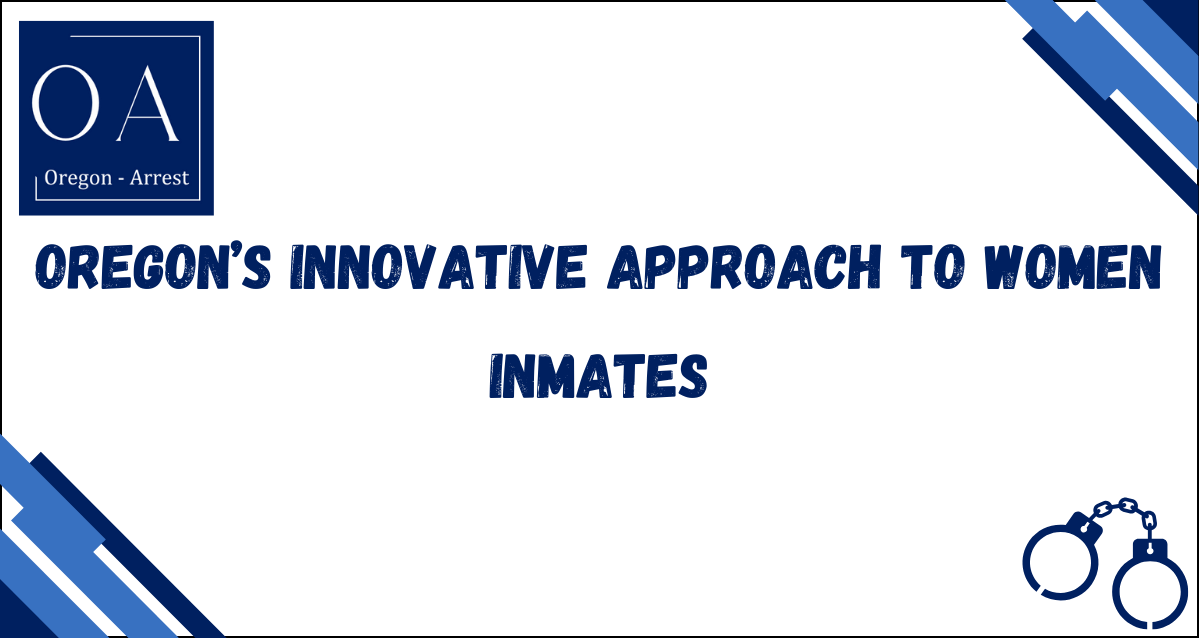Oregon’s Innovative Approach to Women Inmates
When it comes to reimagining the correctional system, Oregon stands at the forefront with its progressive and unique approach toward incarcerated women. Unlike conventional prisons that often emphasize punishment, Oregon’s correctional strategy is centred around rehabilitation, education, and empowerment for female inmates. This groundbreaking approach has gained widespread recognition for its effectiveness in addressing the multifaceted needs of women within the criminal justice system.
In recent years, a growing acknowledgement of the gender-specific challenges faced by women in traditional prison settings has led Oregon to chart a different course. This approach acknowledges the complexities of the women’s journey and strives to provide a holistic and supportive environment during their time in the correctional system. By placing an emphasis on rehabilitation rather than mere incarceration, the state aims to break the cycle of reoffending and offer these women a genuine opportunity to reintegrate into society as empowered and productive individuals.
A Mining for Change: Oregon’s Innovative Approach to Women Inmates
In an era characterized by discussions on criminal justice reform, Oregon’s distinctive approach to its women inmates emerges as a beacon of hope. This approach not only recognizes the issues associated with female incarceration but also endeavours to instigate transformative change. By prioritizing rehabilitation, skill development, and mental health support, Oregon seeks to reshape the lives of women who have become entangled in the criminal justice system.
Holistic Rehabilitation Programs
Oregon’s correctional facilities take a departure from traditional methods by implementing holistic rehabilitation programs for female inmates. These initiatives are designed to address the underlying causes of criminal behaviour. Personalized therapy and counselling sessions are offered to help women confront their past and develop a positive outlook for the future. Moreover, the state provides comprehensive skill development and vocational training, equipping inmates with practical competencies that can substantially improve their prospects upon release. This approach also integrates substance abuse and mental health support to address the root causes of their involvement in the criminal justice system.
Community Integration and Family Bonds
Recognizing the pivotal role of community and family ties in an inmate’s journey to rehabilitation, Oregon has crafted an approach that fosters and strengthens these connections. Contrary to the isolating nature of traditional prisons, the state actively encourages family involvement through various programs that facilitate communication and visits. These initiatives not only maintain essential bonds but also contribute to the overall well-being and motivation of inmates to make positive changes. Additionally, Oregon implements community reentry programs to provide guidance and support as women transition back into society, ultimately reducing the likelihood of returning to criminal behavior.
Trauma-Informed Care and Gender Sensitivity
Oregon’s approach acknowledges the prevalence of trauma in the lives of many women within the criminal justice system. A trauma-informed care model is at the core of the state’s approach, recognizing the potential impact of past traumatic experiences on behaviour. By fostering a safe and supportive environment, this model enables inmates to confront their past traumas and work towards healing. Furthermore, the approach takes into account the unique needs and challenges that women face while incarcerated, encompassing access to gender-sensitive healthcare and specialized support.
FAQ’s
Explore our comprehensive Frequently Asked Questions (FAQ) section to find answers to common queries about OR Arrests.
How has Oregon’s approach impacted recidivism rates among women inmates?
Oregon’s unique approach has showcased promising results in diminishing recidivism rates among women inmates. By prioritizing rehabilitation, skill development, and community integration, the state has successfully facilitated the reintegration of many women into society, reducing the likelihood of them reoffending.
Are other states considering similar approaches for female inmates?
Absolutely. Oregon’s pioneering approach has sparked conversations and initiatives across various states. Numerous correctional systems are now exploring more rehabilitative and gender-specific strategies to cater to the distinctive needs of women inmates, with the ultimate aim of enhancing their post-release outcomes.
How does trauma-informed care benefit incarcerated women in Oregon’s system?
Trauma-informed care plays a pivotal role in the rehabilitation process for incarcerated women. By recognizing the impact of trauma on behaviour and providing a supportive environment for healing, this approach helps women address their past traumas, develop effective coping mechanisms, and embark on a journey of personal growth, thereby increasing their chances of successful reintegration into society.






